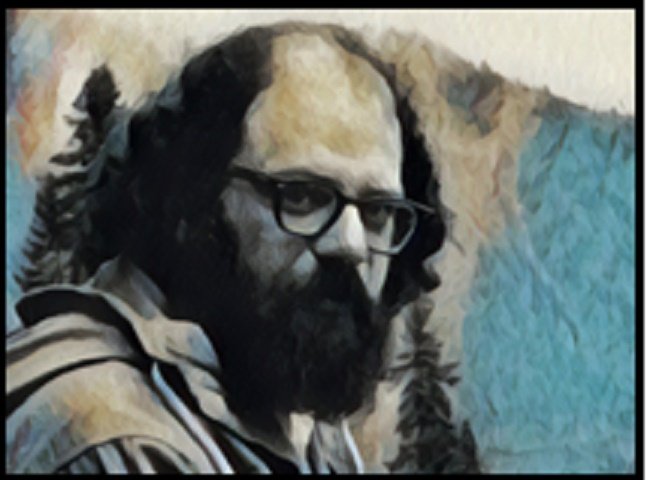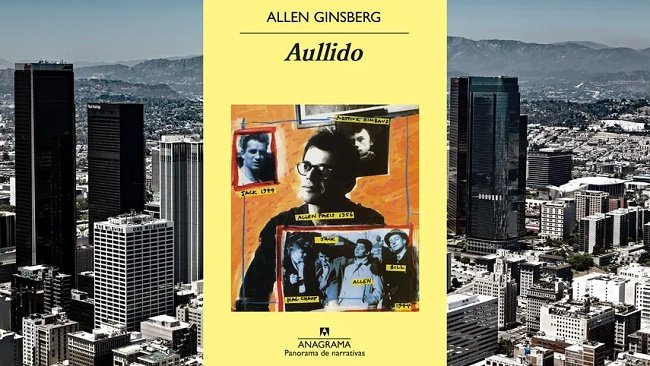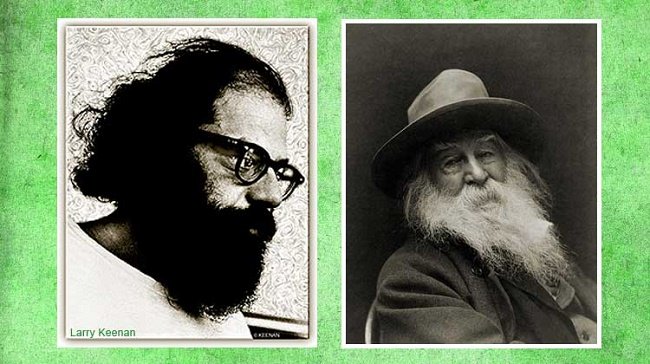ESP
El 3 de junio de 1926 nació una de las voces poéticas más singulares, vivas y rebeldes de la poesía estadounidense y universal del siglo XX, Allen Ginsberg, representante primordial de la llamada “Generación Beat”, grupo que en las décadas del 50 y 60 removió las bases y convencionalismos literarios, culturales y sociales, integrado también por Jack Kerouac y William Borroughts, entre los principales.
ENG
On June 3, 1926 was born one of the most singular, lively and rebellious poetic voices of American and universal poetry of the 20th century, Allen Ginsberg, the main representative of the so-called "Beat Generation", a group that in the 50s and 60s removed the bases and literary, cultural and social conventions, also integrated by Jack Kerouac and William Borroughts, among the main ones.

Ginsberg, de ascendencia judía y con proximidad al budismo, propugnó, junto con los otros miembros de su grupo, la libertad sexual, la condena al militarismo y la guerra, el uso de ciertas drogas, la vida libre de imposiciones. Su influencia es capital en la contracultura hippie, la defensa de los derechos de las minorías o sectores discriminados (mujeres, negros, homosexuales) y en las tendencias de la música de los 60 y 70, en el caso de Bob Dylan, Jim Morrison, Janis Joplin, etc.
La poesía de Ginsberg está influenciada por la de vida y obra de Walt Whitman y Federico García Lorca, como ejemplificaré más adelante, y por el jazz. Será emblema de toda una época marcada por actitudes contestarías e influirá en el modo desprejuiciado con la cual será abordada gran parte de la poesía que se haga en su tiempo y posteriormente, por su estilo desenfadado, la construcción en versos prosaicos o largos períodos en prosa, el ensamblaje de imágenes descoyuntadas o personalmente arbitrarias, el ritmo puntuado, enérgico o violento, al modo del jazz o de la plegaria judía (kaddish), con mucho influjo de la oralidad.
Sus principales libros son: Aullido y otros poemas (1956), Kaddish y otros poemas (1958-1960), La caída de América (1973).
Ginsberg, of Jewish descent and close to Buddhism, advocated, along with the other members of his group, sexual freedom, the condemnation of militarism and war, the use of certain drugs, and a life free of impositions. His influence is capital in the hippie counterculture, the defense of the rights of minorities or discriminated sectors (women, blacks, homosexuals) and in the music tendencies of the 60s and 70s, in the case of Bob Dylan, Jim Morrison, Janis Joplin, etc.
Ginsberg's poetry is influenced by the life and work of Walt Whitman and Federico García Lorca, as I will exemplify below, and by jazz. It will be emblematic of a whole era marked by contentious attitudes and will influence the unprejudiced way in which much of the poetry of his time and later will be approached, by its carefree style, the construction in prosaic verses or long periods in prose, the assembly of disjointed or personally arbitrary images, the punctuated rhythm, energetic or violent, in the manner of jazz or Jewish prayer (kaddish), with much influence of orality.
His main books are: Howl and Other Poems (1956), Kaddish and Other Poems (1958-1960), The Fall of America (1973).

Parte de su obra fue denostada y estuvo prohibida durante un tiempo, aunque luego –curiosidades de la vida– recibió varios reconocimientos públicos y oficiales.
El poeta estadounidense William Carlos Williams, quien fuera su allegado, escribe en el prólogo a una edición de Aullido y otros poemas:
Los poetas están malditos, pero no están ciegos; ven con los ojos de los ángeles. Este poeta ve con toda lucidez los horrores, en los que participa en los detalles más íntimos de su poema. No elude nada sino que lo apura hasta las heces. Lo contiene. Lo reclama como suyo y, creemos, se ríe de ello y tiene el tiempo y la audacia de amar a un compañero de su elección y de dejar constancia de este amor en un buen poema.
A continuación una pequeña muestra de la poesía de Ginsberg.
Part of his work was vilified and banned for a while, although later -curiosities of life- he received several public and official recognitions.
The American poet William Carlos Williams, who was close to him, writes in the prologue to an edition of Howl and Other Poems:
Poets are cursed, but they are not blind; they see with the eyes of angels. This poet sees with all lucidity the horrors, in which he participates in the most intimate details of his poem. He does not elude anything but hurries it to the dregs. He contains it. He claims it as his own and, we believe, laughs at it and has the time and the audacity to love a partner of his choice and to record this love in a good poem.
Here is a small sample of Ginsberg's poetry.

El poema que abrió su obra poética a la difusión y apreciación de su época, “Aullido” (1956), tiene este inicio impactante:
He visto las mejores mentes de mi generación destruidas por la locura, histéricos famélicos muertos de hambre arrastrándose por las calles de los negros al amanecer buscando una dosis furiosa, cabezas de ángel abrasadas por la antigua conexión celestial al dínamo estrellado de la maquinaria de la noche, quienes pobres y andrajosos y con ojos cavernosos y altos se levantaron fumando en la oscuridad sobrenatural de los departamentos con agua fría flotando a través de las alturas de las ciudades contemplando el jazz
The poem that opened his poetic work to the diffusion and appreciation of his time, "'Howl" (1956), has this striking beginning:
I saw the best minds of my generation destroyed by madness, starving hysterical naked,
dragging themselves through the negro streets at dawn looking for an angry fix,
angelheaded hipsters burning for the ancient heavenly connection to the starry dynamo in the machinery of night, who poverty and tatters and hollow-eyed and high sat up smoking in the supernatural darkness of cold-water flats floating across the tops of cities contemplating jazz
“Aullido” es un poema extenso (e intenso), que no puedo reproducir aquí (podrán encontrarlo en las referencias del final). La energía vívida y testimonial de ese comienzo no sólo es innegable, sino su visión de una realidad social –aún vigente– conformada por la disipación y decadencia de personas que conviven con este placer y se reafirman en él como única forma de vida.
"Howl" is a extensive (and intense) poem, which I cannot reproduce here (you will be able to find it in the references at the end). The vivid and testimonial energy of that beginning is not only undeniable, but also its vision of a social reality -still in force- shaped by the dissipation and decadence of people who live with this pleasure and reaffirm themselves in it as the only way of life.

Un supermercado en California
Cómo he pensado en ti esta noche, Walt Whitman,
mientras caminaba por las callejuelas, bajo los árboles,
con dolor de cabeza, ensimismado en la contemplación
de la luna llena.
¡En mi hambrienta fatiga, y para comprar imágenes,
entré en el supermercado de frutas, soñando con tus enumeraciones!
¡Qué duraznos y qué penumbras! ¡Familias enteras
comprando de noche! ¡Pasillos llenos de maridos! Esposas
entre las paltas, bebés entre los tomates!; y tú, García Lorca,
¿qué hacías allí, junto a las sandías?Te vi, Walt Whitman, sin niños, solitario viejo harapiento,
hurgando entre las carnes en el refrigerador,
y mirando a los muchachos de la carnicería.
Oí las preguntas que le hacías a cada uno de ellos:
¿Quién mató las costillas de cerdo? ¿A qué precio las bananas? ¿Eres mi Ángel?
Anduve alternativamente por las brillantes pilas de latas,
siguiéndote, perseguido en mi imaginación por el policía del negocio.
Juntos recorrimos los abiertos corredores de nuestra solitaria fantasía,
probando alcauciles, gozando de cada una de las heladas golosinas,
y sin pasar nunca por la caja.¿A dónde vamos, Walt Whitman? Las puertas se cerrarán
dentro de una hora. ¿Hacia dónde apunta tu barba esta noche?
(Toco tu libro, y sueño con nuestra odisea en el supermercado
y me siento absurdo.)
¿Caminaremos toda la noche por las calles solitarias?
Los árboles añaden sombra a las sombras, las luces de las casas
se apagaron, nos sentiremos solos.
¿Pasearemos soñando con la perdida América del amor
al lado de automóviles azules en las carreteras,
camino hacia nuestra silenciosa casita?
Ah, padre querido, barba gris, solitario y viejo maestro del valor,
¿qué América tuviste cuando Caronte dejó de impulsar su barca
y tú descendiste a una humeante orilla observando
cómo desaparecía la balsa sobre las negras aguas del Leteo?
(Trad. de W. Shand y A. Girri)
A supermarket in California
What thoughts I have of you tonight, Walt Whitman, for I walked down the sidestreets under the trees with a headache self-conscious looking at the full moon.
In my hungry fatigue, and shopping for images, I went into the neon fruit supermarket, dreaming of your enumerations!
What peaches and what penumbras! Whole families shopping at night! Aisles full of husbands! Wives in the avocados, babies in the tomatoes!-and you, García Lorca, what were you doing down by the watermelons?I saw you, Walt Whitman, childless, lonely old grubber, poking among the meats in the refrigerator and eyeing the grocery boys.
I heard you asking questions of each: Who killed the pork chops? What price bananas? Are you my Angel?
I wandered in and out of the brilliant stacks of cans following you, and followed in my imagination by the store detective.
We strode down the open corridors together in our solitary fancy tasting artichokes, possessing every frozen delicacy, and never passing the cashier.Where are we going, Walt Whitman? The doors close in an hour. Which way does your beard point tonight?
(I touch your book and dream of our odyssey in the supermarket and feel absurd.)
Will we walk all night through solitary streets? The trees add shade to shade, lights out in the houses, we'll both be lonely.
Will we stroll dreaming of the lost America of love past blue automobiles in driveways, home to our silent cottage?
Ah, dear father, graybeard, lonely old courage-teacher, what America did you have when Charon quit poling his ferry and you got out on a smoking bank and stood watching the boat disappear on the black waters of Lethe?
El poema leído por Allen Ginsberg | The poem read by Allen Ginsberg
Perteneciente al libro Aullido y otros poemas, este destaca por su tierna belleza afectiva, con la cual el poeta expresa su homenaje a su gran referente en la poesía, Wlt Whitman, con quien se identifica en la soledad, la diferencia y la búsqueda del amor, signado por el deseo homoerótico (No es casual la referencia a García Lorca).
Desde una situación completamente corriente y cotidiana: la visita a un supermercado, imagina su encuentro con el poeta de Hojas de hierba, haciéndole (haciéndose) compañía, recorriendo las calles, rememorando un EU que ya no es, hasta ficcionar la muerte con la referencia mítica a Caronte, el barquero del Hades.
Belonging to the book Howl and other poems, this one stands out for its tender affective beauty, with which the poet expresses his homage to his great reference in poetry, Wlt Whitman, with whom he identifies himself in loneliness, difference and the search for love, marked by homoerotic desire (the reference to García Lorca is not casual).
From a completely ordinary and everyday situation: a visit to a supermarket, he imagines his encounter with the poet of Leaves of Grass, keeping him (or herself) company, walking the streets, remembering an USA that no longer is, until he fictionalizes death with the mythical reference to Charon, the ferryman of Hades.
Referencias | References:
Girri, Alberto (1969). Cosmopolitismo y disensión. Antología de la poesía norteamericana actual. Caracas: Monte Ávila Editores.
https://es.wikipedia.org/wiki/Allen_Ginsberg
https://en.wikipedia.org/wiki/Allen_Ginsberg
https://allenginsberg.org/
https://archive.org/details/aullido-allen-ginsberg
https://www.poetryfoundation.org/poems/49303/howl
https://elciervoherido.wordpress.com/2017/02/22/un-supermercado-en-california-allen-ginsberg/
https://poetapachuco.org/posts/un-supermercado-en-california-allen-ginsberg

Gracias por su lectura | Thank you for reading.
(Los poemas de Ginsberg en inglés fueron extraídos de fuentes suministradas en Referencias.| Ginsberg's poems in English were extracted from the sources provided in References.)





The rewards earned on this comment will go directly to the people ( josemalavem ) sharing the post on LeoThreads,LikeTu,dBuzz.https://leofinance.io/threads/josemalavem/re-leothreads-8qmxmb73
Esta publicación ha recibido el voto de Literatos, la comunidad de literatura en español en Hive y ha sido compartido en el blog de nuestra cuenta.
¿Quieres contribuir a engrandecer este proyecto? ¡Haz clic aquí y entérate cómo!
Gisberg es sin duda una de las voces fundamentales de la poesía estadounidense contemporánea. Gracias por compartirnos sus versos y poder escucharlos en su propia voz. Hasta ahora sólo había leído su más famoso poema "Aullido", el poema homenaje a Whitman me gustó mucho.
Agradecido por tu lectura. Sí, Ginsberg tiene poemas estelares, como "Aullido" y "Kaddish", entre otros. "En un supermercado de California" me parece un hermoso poema. Saludos, @beaescribe.
Te dejamos algunos tokens de regalo: !PIZZA !PGM !LUV !BBH !ALIVE
Y te invitamos a unirte en nuestro Servidor de Discord.
Your Content Is Awesome so I just sent 1 $BBH(3/5)@josemalavem! (Bitcoin Backed Hive) to your account on behalf of @celf.support.
You Are Alive so I just staked 0.1 $ALIVE(3/10)@josemalavem! to your account on behalf of @celf.support.
The tip has been paid for by the We Are Alive Tribe
 through the earnings on @alive.chat, feel free to swing by our daily chat any time you want.
through the earnings on @alive.chat, feel free to swing by our daily chat any time you want.
BUY AND STAKE THE PGM TO SEND A LOT OF TOKENS!
The tokens that the command sends are: 0.1 PGM-0.1 LVL-0.1 THGAMING-0.05 DEC-15 SBT-1 STARBITS-[0.00000001 BTC (SWAP.BTC) only if you have 2500 PGM in stake or more ]
5000 PGM IN STAKE = 2x rewards!
Discord
Support the curation account @ pgm-curator with a delegation 10 HP - 50 HP - 100 HP - 500 HP - 1000 HP
Get potential votes from @ pgm-curator by paying in PGM, here is a guide
I'm a bot, if you want a hand ask @ zottone444
Gracias, amigos de @celf.support.
$PIZZA slices delivered:
(3/10) @celf.support tipped @josemalavem